Navigating the Salesforce Partner Program in FY2026: benefits, requirements, and how to join
Salesforce, the world's #1 CRM, continues to dominate the global market, with over 150,000 customers, including 88% of Fortune 100 companies. Salesforce has become the backbone for how organizations manage data, connect with customers, and grow revenue. To tap into this vast customer market, the essential entry point is the Salesforce Partner Program.
Being part of the program means more than just having a badge. It gives companies access to exclusive resources, training, and co-marketing opportunities directly with Salesforce. It also provides a structured way to prove expertise through certifications, tiering levels, and performance metrics. For clients, this acts as a signal of trust, showing which partners have the skills and experience to deliver results.
What is the Salesforce Partner Program?
The Salesforce Partner Program is a network of experts certified to develop, implement, and optimize Salesforce solutions for clients. At Noltic, we’ve earned Summit (Consulting Partner), Select (ISV Partner), and MSP partnership badges, showcasing our expertise and commitment to delivering high-quality solutions. In this Salesforce Partner Program guide, we'll explore the program's benefits and the steps to join it, drawing from our own experience.
The Salesforce Partner Program ecosystem overview
The Salesforce Partner Program can help you develop new opportunities, achieve success, and deliver exceptional value. Salesforce is strongly committed to partners’ success, making onboarding and growing within the program more accessible.
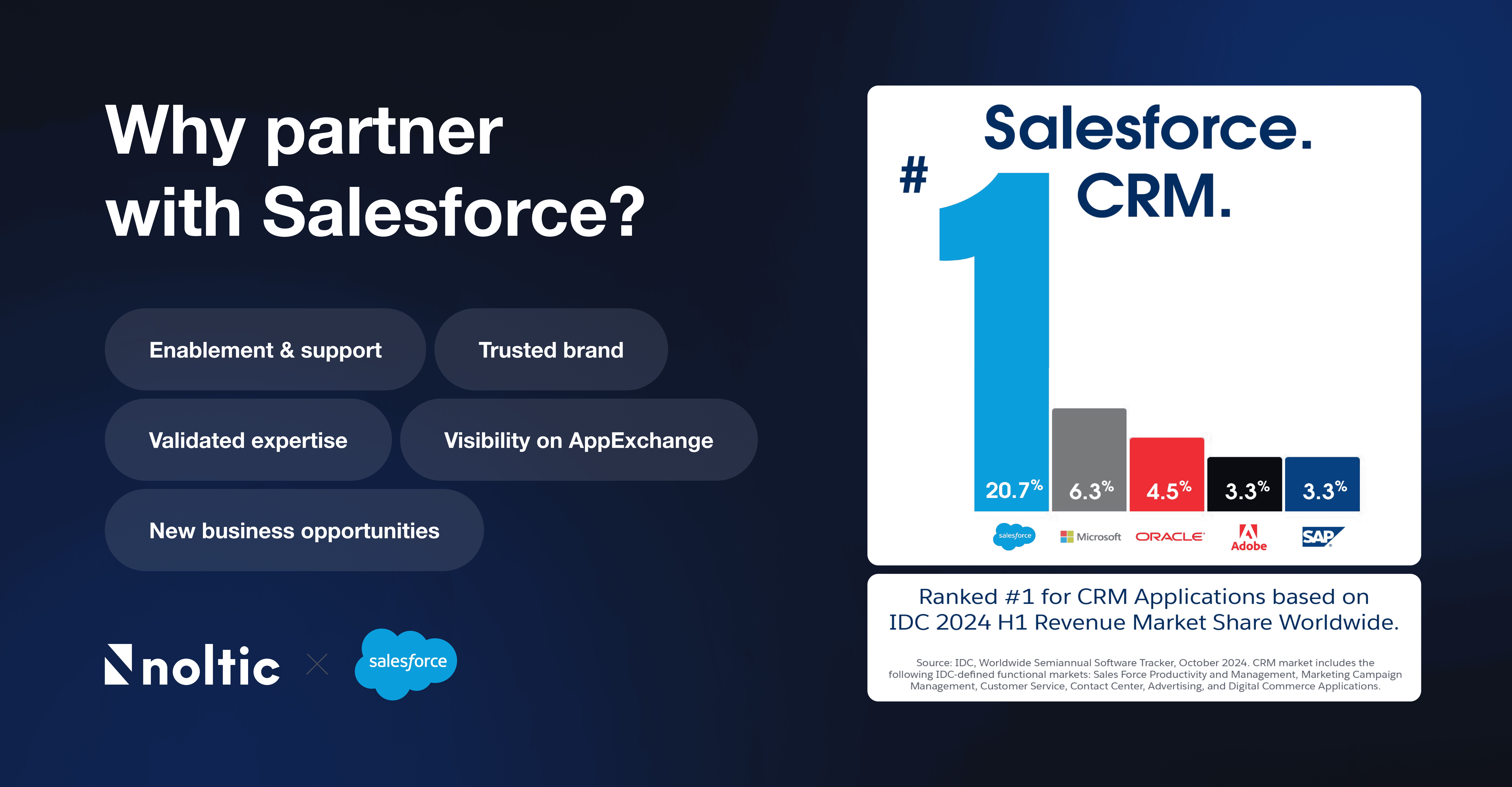
Partners can choose paths and resources that align with their specific market focus and expertise. There are different paths and options customized for consulting, technology, or niche industries, so you can maximize your potential and better serve your clients.
In FY26, all four main tracks of Consulting, MSP, Cloud Reseller, and ISV have their own policies and tiering rules. The ISV track, however, is evaluated not by points but exclusively by the partner journey stages. Additionally, there is a dedicated PDO sub-program for ISVs, which has been established as a standalone program.
Salesforce Partner types
Salesforce Partner Program features four different program tracks to choose from:
- Consulting Partners. These partners provide advisory and implementation services to help clients optimize their Salesforce solutions. They focus on strategy, solution integration, and customization to meet specific business requirements.
- Managed Service Provider (MSP) Partners. They offer ongoing support and management services for Salesforce solutions after implementation, ensuring clients' Salesforce environments are well-maintained and optimized for performance.
- Cloud Reseller Partners. These partners focus on reselling Salesforce's cloud-based solutions. They act as intermediaries between Salesforce and end customers, helping adopt and implement products in countries where Salesforce has a lower reach.
- AppExchange Independent Software Vendor (AppExchange ISV) Partners. They develop and sell applications on the Salesforce marketplace – the AppExchange platform. These partners create solutions that extend Salesforce's native capabilities.
- ISV partners can also collaborate with Product Development Outsourcers (PDOs), who support the development of commercial apps and have their own program — the Salesforce PDO Program.
Salesforce Partner Program tiers
Eligibility for each tier across all tracks except AppExchange ISV partnership is measured and evaluated by the Trailblazer Score in four main pillars: Customer Success, Innovation, Growth, and Impact. The better a partner performs, the more points they earn on their scorecard. All Trailblazer Score points add up to a maximum of 1,000 points.
However, program tiers vary depending on the chosen partnership track. Let’s examine each tier more closely.
Consulting track:
The Salesforce Consulting Partner program has four tiers:
- Base is the entry-level tier for consulting partners. It provides foundational resources and support to help you get started with Salesforce. Base partners can begin to build their practice and access essential training materials.
- Ridge partners receive additional benefits, including access to more advanced resources, training, and support. They are expected to show consistent performance and a commitment to growth.
- Crest tier offers even more resources, including specialized training and access to exclusive programs. Crest partners are recognized for their proven ability to deliver value to customers.
- Summit partners are leaders in the Salesforce ecosystem and play a vital role in driving customer success.

Source: Salesforce
The Trailblazer Score is evaluated quarterly. The tier a partner holds as of March 1 remains in place for the entire fiscal year unless the partner achieves a higher tier during the year. The highest tier earned within a fiscal year carries over as the starting tier for the next year.
Refer to the Consulting Trailblazer Scorecard page for more details.

Source: Salesforce
Consulting Navigator
Navigator helps Salesforce Consulting partners stand out by showcasing their Salesforce-validated expertise, which can be verified on the Salesforce marketplace – AppExchange and used to promote their capabilities to prospects, customers, and Salesforce sales teams.

Source: Salesforce
Navigator now offers three types of expertise distinctions: Specialist, Cloud Expert, and Implementation Expert.
- Specialist validates product, industry, or service expertise.
- Cloud Expert highlights advanced expertise in the Salesforce Cloud.
- Implementation Expert is the highest level and reflects deep specialization validated by Salesforce.
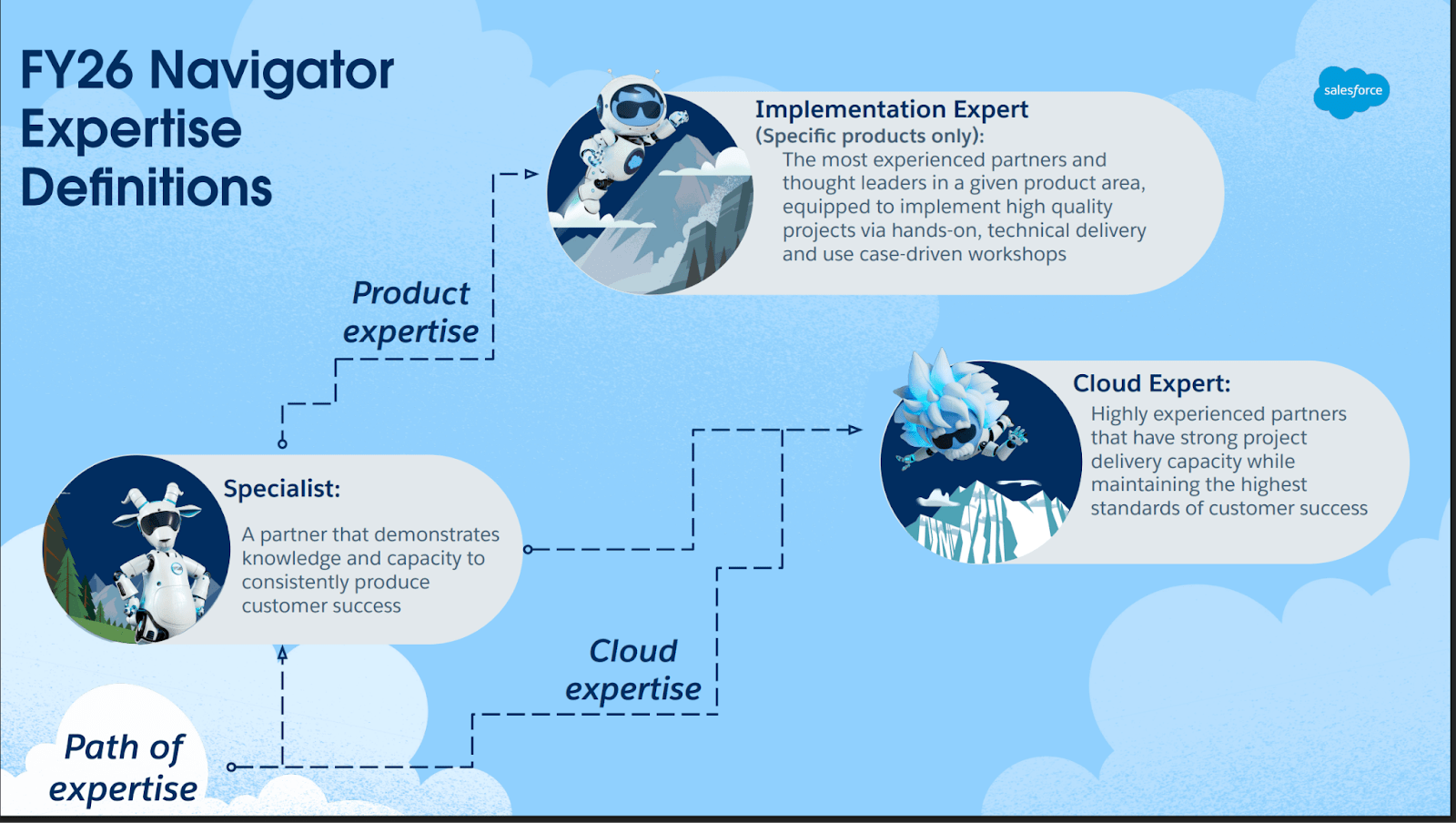
Managed Service Provider (MSP) track:
Managed Services include six main categories:
- Administration;
- Support services;
- Release and change;
- Developer and integration;
- Analytical services;
- AppExchange app management.
MSP partnership track includes three tiers:
- Base tier provides foundational resources and support for partners to establish their managed services within the Salesforce ecosystem;
- Ridge tier is available for partners who demonstrate higher engagement and commitment and includes more advanced training and resources.
- Crest tier is designed for partners with significant expertise in delivering managed services for Salesforce.

Source: Salesforce
MSP Trailblazer Score points are added based on the following criteria:

Source: Salesforce
Cloud Reseller track:
This track, similar to MPS, includes three tiers:
- Base tier is assigned automatically when partners enroll and is later evaluated via the Trailblazer Score.
- Ridge tier is assigned to partners who demonstrate greater engagement and sales performance.
- Crest is the highest available tier and provides advanced training and support for optimizing sales strategies.

Source: Salesforce
The Trailblazer Score points are assigned based on the following achievements:
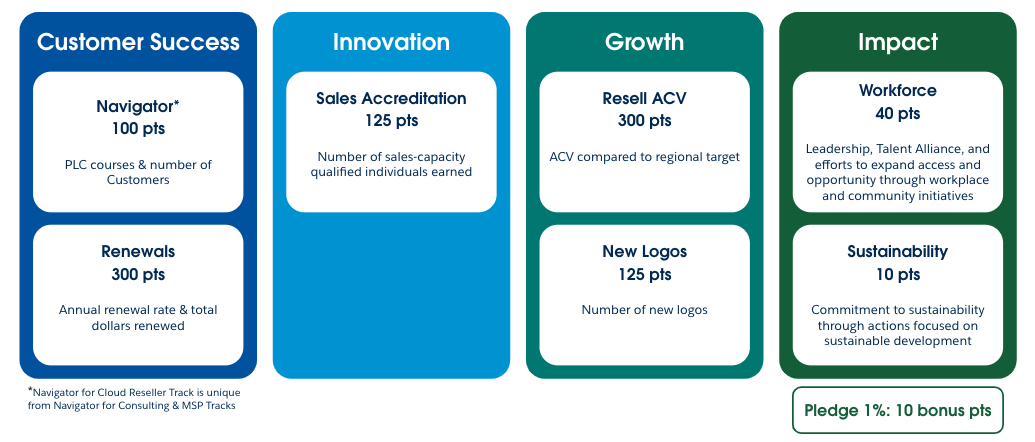
Source: Salesforce
AppExchange ISV track:
The Salesforce ISV partner program helps organizations launch their products quickly and drive business growth. It includes five tiers:
- Registered ISVs tier is the initial partnership level for those who have just joined the program.
- Exploration ISVs tier is created for partners actively researching the market and designing their first app.
- Build ISVs tier focuses on developing solutions and preparing for app launch on the Salesforce marketplace AppExchange.
- Select ISVs partners already have their apps launched on the market and are expanding their offerings.
- Summit ISVs include Salesforce’s key strategic partners.
In FY26, the ISV track does not use the Trailblazer Score. Partner tiers are defined solely by the partner journey stages and are reviewed quarterly.
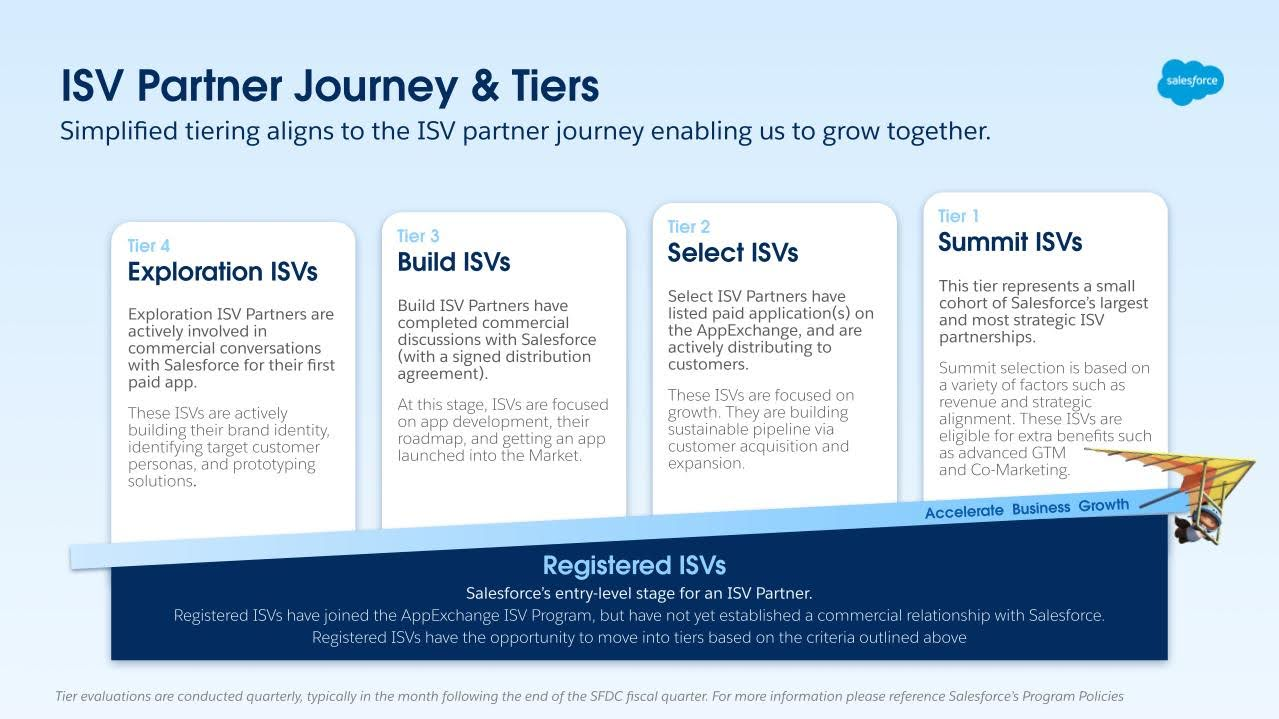
Source: Salesforce
Salesforce Partner Program benefits
All Salesforce partners enjoy a range of benefits designed to help them succeed in the Salesforce ecosystem. While every partner has access to core advantages, those in higher tiers unlock additional perks, such as faster response times from Salesforce managers and early access to new technologies.
Core advantages for all Salesforce partners
Salesforce supports every participant in its program, but the higher your level, the more benefits you unlock.
- Access to professional Salesforce resources
Partners gain access to an extensive library of professional Salesforce resources, including comprehensive documentation, implementation guides, and case studies. This includes access to the Salesforce learning portal, where you can find tutorials and articles on specific functionalities. Additionally, partners can utilize the Salesforce Partner Community to collaborate and share best practices with other members. These tools help you stay updated on the latest features and enhancements, ensuring you can provide the most current solutions to your clients.
- Technical support
Partners receive dedicated technical assistance from Salesforce’s support teams, which is invaluable when troubleshooting or implementing complex solutions. This often includes direct access to a technical account manager who can provide personalized guidance based on the partner's specific needs.
You can also access community forums to connect with other partners and Salesforce experts. This helps ensure that all members can resolve common challenges quickly, minimizing downtime for their clients.
- Certification opportunities
Salesforce encourages partners to enhance the team’s skills and knowledge through various certification programs tailored to different roles and expertise levels. You can pursue certifications for associates, admins, designers, consultants, architects, marketers, developers, and AI experts. Certificates validate your expertise and increase trust and marketability.
Salesforce offers preparation resources, including study guides, practice exams, and instructor-led training sessions, to help partners achieve certification. Attaining certification not only boosts your credibility but also equips you with the skills necessary to provide high-quality services to clients, leading to improved customer satisfaction and retention.
- Discount programs
Partners have access to various discount programs on Salesforce products and services, which can significantly reduce operational costs. These discounts may apply to licensing, training, and event participation fees.
In FY26, “Discount programs” is no longer a separate benefit. It was replaced with two broader categories: Financial Incentives (rebates, bonuses, MDF) and Product Benefits (test licenses, demo orgs, credits).
This financial relief allows partners to offer competitive pricing to their customers while freeing up resources for investments in marketing, training, and additional services. Additionally, you may receive bulk purchase discounts for acquiring multiple licenses, certifications, or services, further enhancing their profitability.
Tier-based benefits for Salesforce Partners
If you've earned enough points in the Trailblazer Score, you’ll unlock additional opportunities. In FY26, Salesforce organizes benefits for Consulting, MSP, and Cloud Reseller partners into five categories:
- Financial Incentives (except MSP)
Partners may qualify for rebates, performance-based bonuses, and Marketing Development Funds (MDF). These incentives reward growth and customer success while providing resources to reinvest in marketing or product development.
(Available from Ridge; MDF typically for Crest and Summit.)
- Product benefits
Access to demo orgs, test licenses, credits, and sandbox environments helps partners develop, showcase, and sell their solutions more effectively.
(Basic demo orgs from Base; extended credits and sandboxes from Ridge and above.)
- Learning benefits
Advanced training includes Partner Learning Camp+, certification boot camps, and Implementation Ready workshops. These resources ensure partner teams deliver consistent, high-quality outcomes.
(Expanded resources mainly from Ridge and Crest; Implementation Ready workshops required at Crest/Summit.)
- Engagement benefits
Higher-tier partners receive priority support, dedicated success managers, and executive engagement opportunities. This ensures faster resolution of challenges and closer alignment with Salesforce's strategy.
(Priority support begins at Ridge; executive engagement is reserved for Crest and Summit.)
- Marketing Benefits
Partners gain enhanced marketing visibility through co-marketing campaigns, Salesforce event participation (e.g., Dreamforce), and featured AppExchange listings. Co-branding and marketing assets strengthen brand awareness and lead generation.
(Marketing assets available from Base; co-marketing and AppExchange boosts start at Ridge; premium event visibility at Crest and Summit.)
The Salesforce Partner Program requirements: how to become a Salesforce partner
Joining the Salesforce Partner Program comes with specific requirements for a specific partnership type. Each of them has distinct criteria to ensure organizations are equipped to represent and deliver Salesforce solutions effectively. Let’s take a look at the detailed requirements:
Consulting and MSP Partner
According to the Salesforce Consulting/MSP Partner Program policies, organizations must meet updated entry requirements to join. Beginning in FY27, a partner can qualify by meeting one of the following:
- 2 certifications plus 1 Stage 2 Lead,
- 3 Stage 2 Leads, or
- 2 certifications plus 2 Qualified Projects.
Once these requirements are met, the partner is admitted into the Program and assigned directly to the Base tier of the Consulting/MSP Partner Program.
Navigator requirements
- Specialist. A partner demonstrating foundational knowledge and the ability to deliver successful customer outcomes consistently. The organization needs at least one certification in the relevant product area, at least three successfully delivered projects with returned CSAT surveys within the past two years, and maintain an average CSAT score of 4.2 or higher.
- Cloud Expert. Requires at least five certified individuals in the relevant product area, ten completed projects with CSAT surveys in the past two years, and an average CSAT score of 4.4 or higher.
- Implementation Expert. The highest level, awarded to partners with proven specialization who also complete Salesforce’s “Deliver Like Salesforce” and “Implementation Ready” workshops.
Cloud Reseller Partner
Sales Accreditation
Resellers are expected to build and maintain Sales Accreditation points in the Innovation pillar of the Trailblazer Scorecard. This can be done through achievements such as:
- Indirect Sales Accredited Professional Exam;
- Tableau Sales Accreditation Exam;
- Salesforce Sales Champion distinctions (Commerce, Customer 360, Data, Marketing, MuleSoft, Sales, Service, Tableau);
- Sales Capacity Learning Journeys (Demand Gen Ready, Pre-Sales Ready, or Sales Ready)
Certifications
Every reseller must hold and keep current the required certifications listed in the Cloud Reseller Minimum Requirements. Examples include:
- Sales Cloud Consultant;
- Service Cloud Consultant;
- Marketing Cloud Consultant;
- Tableau Architect Associate or Tableau Consultant;
- MuleSoft Certified Architect or MuleSoft Developer.
Full-time employee (FTE) requirements
Resellers must build a team of eight dedicated roles within the first year, phased as follows:
- By 3 months: 1 Account Executive, 1 Lead Generation Resource, 1 Marketing Manager;
- By 6 months: an additional Account Executive and 1 Sales Engineer;
- By 9 months: 1 Customer Success / Renewal Manager;
- By 12 months: 2 Consultants (these may be fulfilled through an approved affiliate Consulting Partner)
All FTEs must be focused solely on Salesforce license resell.
Tableau-only resellers
Partners reselling only Tableau products have a reduced staffing requirement of three roles:
- Account Executive / Solution Engineer;
- Lead Generation Resource or Marketing Manager;
- Customer Success / Renewal Manager.
Enablement (new for FY26)
Each year, at least one team member must complete the Salesforce Reseller Essentials enablement course.
Additional requirements:
- Maintain an annual renewal rate of at least 75%;
- Reach a Growth Score of 55 or more (Resell ACV + New Logos) within the first year.

AppExchange ISV Partner program
Salesforce AppExchange program partners should start by registering on the AppExchange Partner Console. This tool allows you to create a listing, track the security review process, and analyze the listing performance.
The next step is to choose the specialization:
OEM Partner
Provides a combined solution that includes the partner's application and a Salesforce license. This solution is offered to both new and existing Salesforce customers. This model requires partners to pay fees to Salesforce for distributing bundled solutions, typically via a revenue share or fee structure.
Data Cloud Partner
Creates applications or integrations that extend the capabilities of Salesforce CDP (Customer Data Platform) by adding new functionality or integrating additional data sources.
Commerce Cloud Partner
Develops applications or integrations that complement Salesforce Commerce Cloud, enhancing its offerings by combining them with the partner’s own products or services.
Tableau – Technology Partner
Partners can build integrations for Tableau Desktop and Tableau Cloud. Tableau ISVs still move through the standard ISV tiers but follow their own onboarding steps.
Developing your AppExchange app in ISV partnerships
After you’ve chosen your specialization, you can start developing your application. At the same time, every ISV progresses through the five program tiers (Registered, Exploration, Build, Select, Summit), with each stage unlocking new benefits and resources. Specializations act as additional go-to-market options rather than replacing this tiered journey.
Here are the steps:
- Create a Trailblazer account.
- Develop your solution and prepare for the AppExchange Security Review. You can begin the AppExchange ISV onboarding process at any development stage, whether your solution is early or advanced. However, you should have a clear architecture ready to present to the AppExchange ISV team. Remember, you're responsible for implementing and maintaining a comprehensive security program for all apps listed on AppExchange. Details about the Security Review requirements and submission process can be found in the AppExchange Partner Console Guide.
- Create your listing in the Listing Builder, where you can build and edit your AppExchange listings for packages and solutions distributed through the AppExchange ISV Partner Program.
- Once you've started the listing process and shared basic company info, the next step is setting your pricing and getting approval. Pricing transparency helps customers understand your app's features. After submitting for business approval, the AppExchange ISV team will review your details and discuss a Partner Application Distribution Agreement (PADA). This process varies for each partner based on technology use cases and go-to-market strategy. The ISV team will help determine the best Salesforce commercial arrangement, either through a standard revenue share or a volume-based fee structure.
- You can publish your listing once you’ve received security review approval, business approval, and confirmed pricing.
AppExchange pricing guide
When creating a listing in the AppExchange Partner Console, ISV partners must define their pricing model. In FY26, Salesforce distinguishes four options:
- Free – the application is available to customers at no cost.
- Paid – customers purchase licenses directly from the partner to unlock full functionality.
- Freemium – a limited free version is available, with advanced features unlocked through payment.
- Paid Add-On Required – the app requires an additional paid Salesforce license or subscription to function fully.
These pricing models have replaced the older “Paid/Free” categorization and are now a standard part of the listing creation process.
Salesforce PDO Program
Alongside the ISV Partner Program, Salesforce offers a dedicated Product Development Outsourcer (PDO) Program. PDOs are consulting partners with proven expertise in helping ISVs design, build, and launch commercial apps on the AppExchange.
PDO partners support the full lifecycle of app development from ideation and architecture design to security review, listing optimization, and go-to-market strategy.
The PDO Program has two levels:
- Specialist PDO is the entry level, available to partners with a Navigator Specialist distinction, at least one credentialed individual, and verified ISV projects with a CSAT above 4.2.
- Cloud Expert PDO is the top level, requiring a Navigator Cloud Expert distinction, five credentialed individuals, and at least 10 verified projects with an average CSAT above 4.4.
PDO partners gain additional visibility on the AppExchange, access to product pilots and co-innovation opportunities, and are often introduced directly to ISVs seeking development expertise.
A step-by-step guide to joining the Salesforce Partner Program
Are you ready to enjoy the benefits of becoming a Salesforce partner? Let’s dive into the details:
1. Choose what partnership type suits your goals best
Start by assessing your goals and expertise to choose the right partnership type. To find more details on each partnership and which one suits you, visit the Salesforce Partner Program overview page.
2. Register for the Salesforce Partner Community
After deciding on your partner type, the next step is registering for the Salesforce Partner Community, which is the hub for resources, tools, and support. Follow these steps:
- Go to the Salesforce Partner Community Registration page;
- Fill out the form with your business and contact details;
- Choose the type of partner program you want to join (Consulting, ISV, etc.);
- Submit the registration form.
Once you submit it, you’ll receive a confirmation email with further instructions. You can then log in to the Partner Community to access resources and start using tools like Partner Navigator, Partner Learning Camp, and your Partner Business Org (PBO).
3. Complete the partner application
After registering, you will need to complete a more detailed application that includes:
- Business information with details about your company, such as size, location, and contact details;
- Salesforce products or services your business is experienced in;
- Your team’s certifications and experience with Salesforce.
Once you’ve provided all the necessary information, submit your application for review. The Salesforce team will assess your application and might reach out if they need additional information.
4. Complete the Due Diligence Review
As part of becoming an official Salesforce Partner, you must undergo a due diligence process to ensure compliance with Salesforce’s standards on integrity, anti-bribery, and anti-corruption.
- Consulting/MSP partners: submit the Due Diligence Questionnaire (DDQ) and Compliance Certification in the Partner Community.
- Cloud Resellers: complete the DDQ plus a Reseller Business Plan (provided by the enrollment team).
- ISVs: instead of DDQ, submit a Business Plan tied to your AppExchange listing.
The review can take several weeks, depending on the completeness of your submission and any compliance concerns.
5. Accept the Salesforce Partner Program Agreement (SPPA)
Once Salesforce reviews and approves your application, you must accept the Salesforce Partner Program Agreement (SPPA) to become a partner. This agreement outlines the terms and conditions of your partnership with Salesforce, including:
- Program fees: depending on your track, this can mean an annual fee (for Consulting, MSP, or Cloud Resellers) or a revenue-share model (for ISVs on AppExchange).
- Salesforce’s code of conduct, data security standards, and other operational guidelines.
- Partner’s role in maintaining certifications, staying updated on Salesforce products, and adhering to Salesforce's brand usage guidelines.
6. Complete onboarding and training
After accepting the SPPA, you’ll receive onboarding materials and resources to help you get started as a Salesforce partner. This process includes:
- Sales and technical Trailhead modules, specifically designed for partners, help your team familiarize themselves with Salesforce’s ecosystem;
- Partner-exclusive resources, marketing materials, Salesforce-specific tools, and development environments like Partner Business Org (PBO) for ISV partners;
- Dedicated partner support, where you can contact Salesforce experts to guide you through implementation issues, product questions, or certifications.
You can monitor your progress and access all these resources through the Partner Learning Camp.
Our experience of becoming a member of the Salesforce Partner Program
Becoming a Salesforce implementation partner and member of the Salesforce Partner Program was a key step in our growth at Noltic. The journey wasn’t just about meeting the technical requirements; it was about aligning ourselves with Salesforce's vision and its rigorous standards. We are a Salesforce certified partner and currently hold the titles of Summit Consulting Partner, Base MSP, and Select ISV Partner, reflecting our contributions to building innovative solutions on AppExchange.
We started by focusing on the basics: completing Salesforce certifications for our team. Now, we boast more than 400 of them, and we continue learning every day to stay on track. Meanwhile, we started building a portfolio of successful projects and proving our expertise in delivering solutions using the Salesforce platform. For our team, the certifications are not a simple formality, since they ensure our team has the knowledge and skills to address real-world challenges.
Next, we submitted our application, which included showcasing our clients’ success. We highlighted how we’d helped businesses adopt Salesforce and transform their operations. These case studies played an enormous role in demonstrating our ability to deliver results.
One of the more challenging aspects was earning our Navigator badges. Each badge required a combination of certifications, skills for building customer success, and ongoing commitment to learning.
Now we possess Navigator badges in Salesforce solutions:
- Cloud Expert badges in Customer 360 Platform, Experience Cloud, Service Cloud, and Sales Cloud.
- Specialist badges in more than 20 specializations.
Conclusion
Becoming a member of the Salesforce Partner Program is more than just a badge. Being a partner shows a commitment to delivering quality, innovation, and results to clients. With Salesforce being the top CRM worldwide, joining this ecosystem opens up opportunities to provide transformative solutions across multiple industries. We’ve experienced firsthand how this program equips us with the right tools, support, and expertise to take our services to the next level.
Our journey through the program involved earning certifications, meeting strict requirements, and showcasing our successful Salesforce projects, such as our in-house products like Tracky , CheckMyNumber, Documate, and Dokobit. The resources and support we’ve gained from being part of the Salesforce Partner Program have allowed us to grow, strengthen our expertise, and better serve our clients.
FAQs
Can I change my partner tier?
Yes, you can change your partner tier, but it’s not an automatic process. To move to a higher tier, your business must meet specific criteria set by the Salesforce Partner Program. These criteria typically include the number of Salesforce certifications your team holds, the customer success stories you can provide, the number of active projects, and the revenue generated from Salesforce-related services.
Salesforce regularly reviews partner performance and awards points for earning new certifications, delivering successful customer projects, and achieving high customer satisfaction scores. You can apply for an upgrade if you accumulate enough points to meet the requirements for a higher tier. Conversely, if your performance drops, you may be downgraded. Therefore, regularly monitoring your progress using Salesforce’s Partner Navigator is essential to understand how close you are to reaching the next tier.
How do I choose the right specialization for my business?
Choosing the right specialization depends on your company’s expertise, your team’s skills, and the needs of your target clients. Start by evaluating your past projects: what industries have you been most successful in? Have you developed expertise in specific Salesforce products, such as Sales Cloud, Service Cloud, or Marketing Cloud? If your team has certifications in these areas, they might be the right direction for specialization.
Salesforce offers a variety of specializations under two main categories: Industry Specialization and Product Specialization. Industry specialization allows you to focus on sectors like financial services, healthcare, or manufacturing, where you can tailor solutions to meet industry-specific regulations and needs.
Product specialization allows you to focus on specific Salesforce products like Field Service Lightning or CPQ. It’s crucial to align your choice with the demands of your target market and the certifications you can offer. Specializing in high-demand areas increases your credibility and opens more doors for opportunities.
Are there any benefits to specializing in a particular industry or product?
Yes, specializing in a particular industry or product brings several advantages. First, it positions your business as an expert, which can help you attract more targeted clients who need specific solutions. Specialization also allows you to develop deeper expertise, leading to more effective and efficient implementations, which enhances customer satisfaction and can result in repeat business or referrals.
Salesforce offers specialized partner support through marketing resources, partner events, and co-selling opportunities. For example, specializing in an industry like financial services can give you access to Salesforce's Financial Services Cloud resources, tailored customer success stories, and joint go-to-market initiatives with Salesforce. Specialization can also improve your visibility within the Salesforce ecosystem, making it easier for potential clients to find and trust you when looking for a partner with specific expertise.
How can I find resources and training as a partner?
As a Salesforce partner, you have access to various resources and training materials to help you develop your team’s expertise. The Partner Learning Camp is Salesforce’s primary platform for partner training. It offers courses on everything from Salesforce basics to advanced development and implementation techniques. You can also pursue certifications in areas relevant to your specialization, such as Salesforce Administrator, Platform Developer, or Solution Architect.
In addition to Partner Learning Camp, you can access the Salesforce Partner Community, where you’ll find a wealth of documentation, webinars, success stories, and best practices to support your growth.
Salesforce frequently updates its platform, so staying current with new features and updates is crucial. The Partner Community offers technical documentation and release notes to help you stay up-to-date. Lastly, Salesforce organizes events like Dreamforce and Salesforce Partner Summits, which provide excellent networking and learning opportunities.
How can I increase my revenue as a Salesforce partner?
There are multiple strategies to increase your revenue as a Salesforce partner. One of the most effective ways is to develop deep expertise in high-demand Salesforce products or specific industries. For example, gaining a specialization in industries like healthcare or financial services can allow you to charge premium prices for tailored solutions.
Another strategy is to offer additional services beyond implementation, such as consulting, ongoing support, or managed services. This creates a stable revenue stream from clients who need continuous optimization and management of their Salesforce environments.
Additionally, building custom solutions or apps for the Salesforce AppExchange can open up new revenue channels. By creating scalable products that solve common business problems, you can generate passive income through licensing or selling these apps.
Taking advantage of Salesforce co-selling opportunities is also critical. As a partner, Salesforce may help you find and close deals by co-selling to their customers, especially if you offer specialized skills or services that complement Salesforce's core offerings. Finally, continuously investing in your team’s certifications and skills can help you handle more complex projects, charge higher rates, and grow your client base.
together
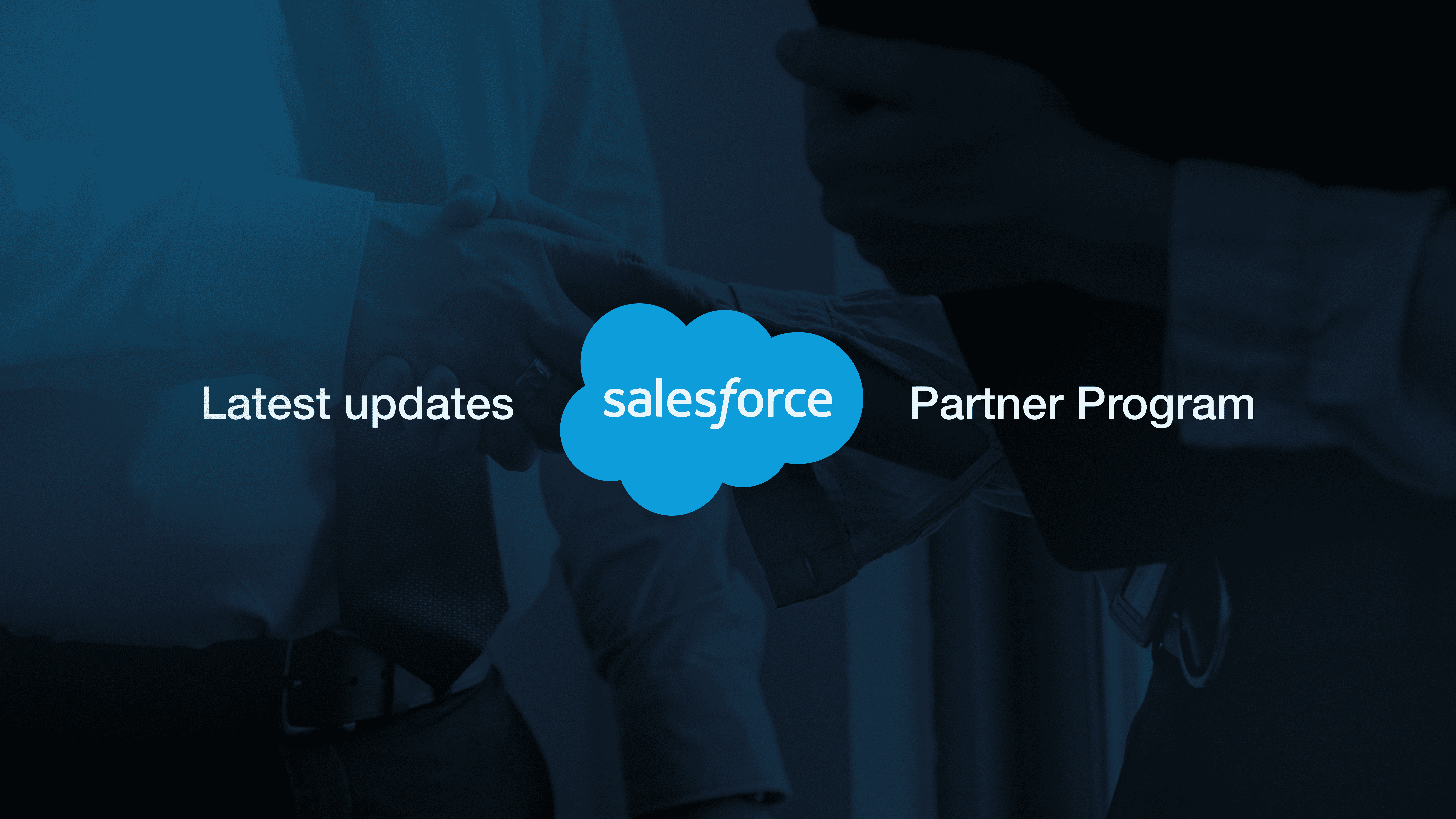
.webp)

